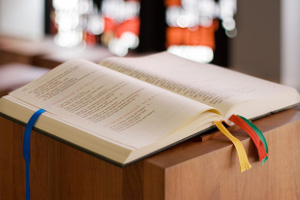 It is delightful that the friend in our passage shares his bed with his children (v7).
It is delightful that the friend in our passage shares his bed with his children (v7).
This is again a small reminder that we are looking into a different world. It comes as a shock how different Luke’s version of the “(Our) Father” is. But it is wonderful how his use of the word ‘sins’ (hamartia) really shows up the ‘indebted’ (opheiló) in the same verse (4).
Matthew (6: 9-13) uses derivatives of debt both times in his version of this prayer. Interestingly the verb that belongs to getting rid of both sin and debt is ‘to let go’ or to ‘leave’ (aphiémi). A loosening of something that binds you.
It shows a very financial image in times when debt has taken on global significance and is threatening our economy and society. I wonder who really owes us, and what do they really owe us, and what do we really owe and how can we let go? A question that can be asked in our personal lives as is often done when praying this prayer of Jesus. The same question could be asked of our global economy.
Put in these terms I wonder whether honest answers might bring that Kingdom of God a good deal nearer. At the end of this passage it seems as if Luke is not very confident that we know what ‘good gift’ to ask of our ‘heavenly Father’; he just makes sure that we are clear about what to ask, knock and search for: the Holy Spirit. She will help us to let go.
24 July 2016
Luke: 11:1-13
This weekly blog on one of the lectionary readings is by Anne Claar Thomasson-Rosingh, Programme Leader for Lifelong Learning at Sarum College.

Leave a Reply